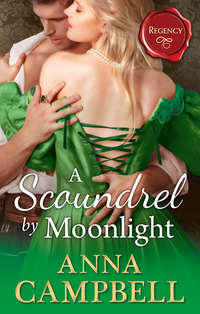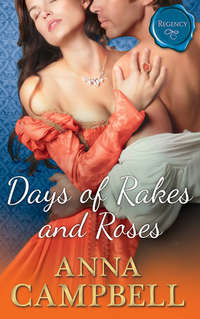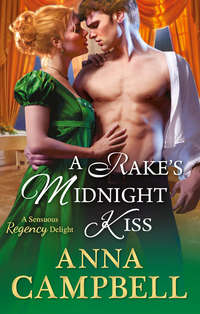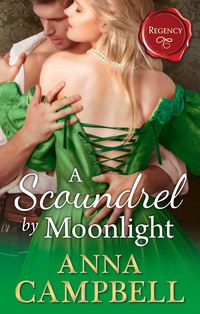
Полная версия
Regency Rogues and Rakes: Silk is for Seduction / Scandal Wears Satin / Vixen in Velvet / Seven Nights in a Rogue's Bed / A Rake's Midnight Kiss / What a Duke Dares
“Racing to Paris to give Clevedon an ultimatum,” she said. “‘Marry my sister or else.’ Was that your idea of helping, too?”
He opened his eyes and looked up at her. “Who told you that?”
“All the world has been talking of it,” she said. “For weeks, it seems. I was bound to hear eventually.”
“All the world is insane,” he said. “Ultimatum, indeed. There was nothing like it. I only asked him whether he wanted you or not.”
“Oh, no.” She sank into a nearby chair and put her hand over her mouth. Her face was on fire. How could he? But what a question. Of course he could. Harry had never been known for his tact and sensitivity.
“Better me than Father,” he said.
She closed her eyes. He was right. Papa would write a letter. It would be much more discreet and far more devastating to Clevedon than anything Harry could say. Father would have the duke tied up in knots of guilt and obligation—and that, she suspected, was probably what had driven his grace to the Continent in the first place.
She took her hand from her mouth and opened her eyes and met her brother’s gaze. “You truly think it’s come to that?”
“My dear girl, Mother is driving me mad, and I don’t have to live with her. I came to dread stopping at home because I knew she’d harp on it. It was only a matter of time before Father gave up trying to ignore her. You know he never wanted us to go away in the first place. Well, not Clevedon, at any rate. Me, he was only too happy to see the back of.”
It was true that Mama had grown increasingly strident in the last few months. Her friends’ daughters, who’d come out at the same time Clara had, were wed, most of them. Meanwhile Mama was terrified that Clara would forget Clevedon and become infatuated with someone unsuitable—meaning someone who wasn’t a duke.
Why do you encourage Lord Adderley, when you know he’s practically bankrupt? And there is that dreadful Mr. Bates, who hasn’t a prayer of inheriting, with two men standing between him and the title. You know that Lord Geddings’s country place is falling to pieces. And Sir Henry Jaspers—my daughter—encouraging the attentions of a baronet? Are you trying to kill me by inches, Clara? What is wrong with you, that you cannot attach a man who has loved you practically since birth and could buy and sell all the others a dozen times over?
How many times had Clara heard that rant, or one like it, since they’d returned to London for the Season? “I know you meant well,” she said. “But I wish you hadn’t.”
“He’s been abroad for three years,” Harry said. “The situation begins to look a little ridiculous, even to me. Either he means to marry you or he doesn’t. Either he wants to live abroad or he wants to live in England. I think he’s had time enough to make up his mind.”
She blinked. Three years? It hadn’t seemed so long. She’d spent the first of those years grieving for her grandmother, whom she’d adored. She hadn’t had the heart to make her debut then. And that year and those following had been filled with Clevedon’s wonderful letters.
“I didn’t realize it was so long,” she said. “He writes so faithfully, it seems as though he’s here.” She’d been writing to him since she first learned to scrawl such inanities as “I hope this finds you well. How do you like school? I am learning French. It is difficult. What are you learning?” Even as a boy, he’d been a delightful correspondent. He was a keen observer, and he had a natural gift for description as well as a wicked wit. She knew him very well, better than most knew him, but that was mainly through letters.
It dawned on her now that they hadn’t spent much time together. While she’d been in the schoolroom, he’d been away at school, then university. By the time she’d entered Society, he’d gone abroad.
“I daresay he didn’t realize it, either,” Harry said. “When I asked him straight out what he was about, he laughed, and said I did well to come. He said he supposed he might have returned sooner, but your letters told him you were enjoying being the most sought-after girl in London Society, and he didn’t like to spoil your fun.”
She hadn’t wanted to spoil his, either. His had not been a pleasant childhood. He’d lost father, mother, and sister in the course of a year. Papa meant to be a kind guardian, but he had very strict ideas about Duty and Responsibility, and Clevedon, unlike Clara’s brothers, had tried to live up to his standards.
When Clevedon and Harry had decided to go abroad, she’d been glad for them. Harry would acquire some culture, and Clevedon, away from Papa, would find himself.
“He ought not to come home before he’s quite ready,” she said.
Harry’s black eyebrows went up. “Are you not quite ready?”
“Don’t be absurd.” Of course she’d be happy to have Clevedon back. She loved him. She’d loved him since she was a little girl.
“You needn’t worry about being hurried to the altar,” Harry said. “I suggested he wait until the end of May. That will give your beaux plenty of time to kill themselves or go into exile in Italy or some such or quietly expire of despair. Then I recommended he give you another month to get used to having his hulking great carcass about. That will take you to the end of the Season, at which point I suggested a beautifully worded formal offer of marriage, with many protestations of undying affection, accompanied by a prodigious great diamond ring.”
“Harry, you’re ridiculous.”
“Am I? He thought it was an excellent idea—and we celebrated with three or four or five or six bottles of champagne, as I recollect.”
Paris
15 April
Seduction was a game Clevedon very much enjoyed. He relished the pursuit as much—and lately, more—than the conquest. Chasing Madame Noirot promised to be a more amusing game than usual.
That would make for a change and a pleasant finish to his sojourn abroad. He wasn’t looking forward to returning to England and his responsibilities, but it was time. Paris had begun to lose its luster, and without Longmore’s entertaining company, he foresaw no joy in wandering the Continent again.
He’d planned to go to Longchamp, in any event, to observe, in order to write Clara an entertaining account of it. He still owed her an account of the opera—but never mind. Longchamp would provide richer fodder for his wit.
The annual promenade in the Champs Élysées and the Bois de Boulogne occurred on the Wednesday, Thursday, and Friday of the week preceding Easter. The weather, which had promised so well earlier in the week, had turned, bringing a chill wind. Nonetheless, all of Paris’s haut ton appeared, all dressed in the latest fashions, and showing off their fine horses and carriages. These went up the road on one side and down on the other. The center belonged to royal carriages and others of the highest ranks. But a great many attending, of both high and lower degree, traversed the parade on foot, as Clevedon had chosen to do, the better to study and eavesdrop on the audience as well as the participants.
He’d forgotten how dense a crowd it was, far greater than Hyde Park at the fashionable hour. For a time he wondered how the devil he was supposed to find Madame Noirot. Everyone and her grandmother came to Longchamp.
Mere minutes later, he was wondering how it would have been possible to miss her.
She made a commotion, exactly as she’d done at the opera. Only more so. All he had to do was turn his gaze in the direction where the accidents happened, and there she was.
People craned their necks to see her. Men drove their carriages into other carriages. Those on foot walked into lamp posts and each other.
And she was enjoying herself thoroughly, of that he had no doubt.
This time, because he viewed her from a distance, undistracted by the brilliant dark eyes and beckoning voice, he could take in the complete picture: the dress, the hat…and the way she walked. From a distance, he could pay attention to the ensemble: the straw bonnet trimmed with pale green ribbons and white lace, and the lilac coat that opened below the waist to display a pale green fluttery concoction underneath.
He watched one fellow after another approach her. She would pause briefly, smile, say a few words, then walk on, leaving the men staring after her, all wearing the same dazed expression.
He supposed that was what he’d looked like last night, after she’d taken her leave of him.
He made his way through the crowd to her side. “Madame Noirot.”
“Ah, there you are,” she said. “Exactly the man I wished to see.”
“I should hope so,” he said, “considering you invited me.”
“Was it an invitation?” she said. “I thought it was a broad hint.”
“I wonder if you hinted the same to everyone at the Italian Opera. They all seem to be here.”
“Oh, no,” she said. “I only wanted you. They’re here because it’s the place to be seen. Longchamp. Passion Week. Everyone comes on holy pilgrimage to see and be seen. And here am I, on display.”
“A pretty display it is,” he said. “And exceedingly modish it must be, judging by the envious expressions on the women’s faces. The men are dazzled, naturally—but they’re no use to you, I daresay.”
“It’s a delicate balance,” she said. “I must be agreeable to the men, who pay the bills. But it’s the ladies who wear my clothes. They won’t be eager to patronize my shop if they see me as a rival for the attentions of their beaux.”
“Yet you dropped me a broad hint to come today and seek you out in this mob,” he said.
“So I did,” she said. “I want you to pay some bills.”
It was, yet again, the last thing he expected. This time he was not amused. His body tensed, and his temperature climbed and it had nothing to do with desire. “Whose bills?”
“The ladies of your family,” she said.
He could hardly believe his ears. He said, his jaw taut, “My aunts owe you money, and you came to Paris to dun me?”
“Their ladyships your aunts have never set foot in my shop,” she said. “That’s the problem. Well, one of the problems. But they’re not the main issue. The main issue is your wife.”
“I don’t have a wife,” he said.
“But you will,” she said. “And I ought to be the one to dress her. I hope that’s obvious to you by now.”
He needed a moment to take this in. Then he needed another moment to tamp down his outrage. “Are you telling me you came all the way to Paris to persuade me to let you dress the future Duchess of Clevedon?”
“Certainly not. I come to Paris twice a year, for two reasons.” She held up one gloved index finger. “One, to attract the attention of the correspondents who supply the ladies’ magazines with the latest fashion news from Paris. It was an admiring description of a promenade dress I wore last spring that drew Mrs. Sharp to Maison Noirot. She in turn recommended us to her dear friend Lady Renfrew. By degrees, their friends will soon join our illustrious clientele.”
“And the second reason?” he said impatiently. “You needn’t put up your fingers. I am perfectly able to count.”
“The second reason is inspiration,” she said. “Fashion’s heart beats in Paris. I go where the fashionable people go, and they give me ideas.”
“I see,” he said, though he didn’t, really. But this was his payment, he told himself, for consorting with a shopkeeper, a vulgar, money-grubbing person. He could have bedded Madame St. Pierre last night—and he was running out of time for bedding anybody—but he’d spoiled his chance by chasing this—this creature. “I am merely incidental.”
“I’d hoped you’d be intelligent enough not to take it that way,” she said. “My great desire is to be of service to you.”
He narrowed his eyes. She thought she could play him for a fool. Because she’d lured him across an opera house and into the Longchamp mob, she imagined she’d enslaved him.
She wouldn’t be the first or the last woman to let her imagination run away with her in that way.
“I only ask you to consider,” she said. “Do you want your lady wife to be the best-dressed woman in London? Do you want her to be a leader of fashion? Do you want her to stop wearing those unfortunate dresses? Of course you do.”
“I don’t give a damn what Clara wears,” he said tautly. “I like her for herself.”
“That’s sweet,” she said, “but you fail to consider her position. People ought to look up to and admire the Duchess of Clevedon, and people, generally, judge the book by the cover. If that were not the case, we’d all go about in tunics and blankets and animal hides, as our ancestors did. And it’s silly for you of all men to make out that clothes are not important. Only look at you.”
He was all but dancing with rage. How dare she speak of Clara in that way? How dare she patronize him? He wanted to pick her up and—and—
Devil confound her. He couldn’t remember when last he’d let a woman—a shopkeeper, no less—ignite his temper.
He said, “Look about you. I’m in Paris. Where fashion’s heart beats, as you said.”
“And do you wear any old thing in London?” she said.
He was so busy trying not to strangle her that he couldn’t think of a proper retort. All he could do was glare at her.
“It’s no use scowling at me,” she said. “If I were easily intimidated, I should never have got into this business in the first place.”
“Madame Noirot,” he said, “you seem to have mistaken me for someone else. A fool, I believe. Good day.” He started to turn away.
“Yes, yes.” She gave a lazy wave of her hand. “You’re going to storm off. Go ahead. I’ll see you at Frascati’s, I daresay.”
Chapter Three

HOTEL FRASCATI, No. 108, rue de Richelieu. This is a gaming-house, which may be considered the second in Paris in point of respectability, as the company is select. Ladies are admitted.
Galignani’s New Paris Guide, 1830
Clevedon stopped, turned back, and looked at her.
His eyes were green slits. His sensuous mouth was set. A muscle worked at his jaw near his right ear.
He was a large, powerful man.
He was an English duke, a species known for its tendency to crush any small, annoying thing that got in its way.
His stance and expression would have terrified the average person.
Marcelline was not an average person.
She knew she’d waved a red cape in front of a bull. She’d done it as deliberately as an experienced matador might. Now, like the bull, he was aware of no one else but her.
“Confound you,” he said. “Now I can’t storm away.”
“I shouldn’t blame you if you did,” she said. “You’ve been greatly provoked. But I warn you, your grace, I am the most determined woman you’ll ever meet, and I am determined to dress your duchess.”
“I’m tempted to say, ‘Over my dead body,’” he said, “but I have the harrowing suspicion that you will answer, ‘If necessary.’”
She smiled.
His countenance smoothed a degree and a wicked gleam came into his eyes. “Does this mean you’ll do whatever is necessary?”
“I know what you’re thinking,” she said, “and that will not be necessary. Pray consider, your grace. What self-respecting lady would patronize a dressmaker who specializes in seducing the lady’s menfolk?”
“Ah, it’s a specialty, is it?”
“You of all men must know that seduction is an art, and some practitioners are more skilled than others,” she said. “I’ve chosen to apply my talents to dressing ladies beautifully. Women are capricious and difficult to please, yes. Men are easy to please but far more capricious.”
To a discerning woman, his beautiful face was wonderfully expressive. She watched, fascinated, while a speculative expression gradually erased the lingering signs of temper. He was puzzling over her, revising his original estimation and, therefore, his tactics.
This was an intelligent man. She had better be very careful.
“Frascati’s,” he said. “You’re a gambler.”
“The game of chance is my favorite sport,” she said. Gambling—with money, with people, with their futures—was a way of life for her family. “Roulette, especially. Pure chance.”
“This explains the risks you take with men you don’t know,” he said.
“Dressmaking is not a trade for the faint of heart,” she said.
The humor came back into his green eyes and the corners of his mouth quirked up. On any other man that look would have been charming. On him it was devastating. The eyes, the sweet little smile—it stabbed a girl to the heart and then lower down.
“So it would seem,” he said. “A more dangerous trade than I’d supposed.”
“You’ve no idea,” she said.
“This promises to be interesting,” he said. “I’ll see you at Frascati’s.”
He made her a bow, and it was pure masculine grace, the smooth and confident movement of a man completely at ease in his powerful body.
He took his leave, and she watched him saunter away. she watched scores of elegant hats and bonnets change direction as other women watched him pass.
She’d thrown down the gauntlet and he’d taken it up, as she’d known he would.
Now all she had to do was not end up on her back with that splendid body between her legs.
That was not going to be easy.
But then, if it were easy, it wouldn’t be much fun.
London
Wednesday night
Mrs. Downes waited in a carriage a short distance from the seamstress’s lodgings. Shortly after half-past nine, the seamstress passed the carriage. She glanced up but didn’t stop walking. A moment later, Mrs. Downes stepped down from the carriage, continued down the street, and greeted the young woman as though theirs was an accidental encounter of two old acquaintances. They asked after each other’s health. Then they walked a few steps to the door of the house where the seamstress lived. After a moment of conversation, the seamstress withdrew from her pocket a folded piece of paper.
Mrs. Downes reached for it.
“The money first,” the seamstress said.
“Let me see what it is first,” Mrs. Downes said. “For all I know, it’s nothing out of the way.”
The seamstress stepped closer to the street lamp and opened the folded sheet of paper.
Mrs. Downes gave a little gasp, and hastily covered it up with a disdainful sniff. “Is that all? My girls can run up something like that in an hour. It’s hardly worth half a crown, let alone a sovereign.”
The seamstress folded up the paper. “Well, then, let them do it if they can,” she said. “I’ve made notes on the back about how it’s done, but I’m sure your clever girls don’t need any help working out how to keep those folds the way she has them, or how to make those bows. And you don’t need to know which ribbon she uses and who she gets it from. No, indeed, you don’t want any of that. So I’ll take this in with me, shall I, and throw it on the fire. I know how it’s done, and Madame knows how it’s done, and one or two of our less clumsy girls know the trick.”
This particular seamstress spoke dismissively of the others, deeming herself superior to them and not half-properly appreciated. Otherwise, she wouldn’t have been standing in the street, late at night, when she was hungry for her supper. She certainly wouldn’t be talking to the competition if Some People valued her as they ought to do.
“No, madam, you don’t need a bit of it,” she said, “and I wonder at your coming out at this hour, wasting your valuable time.”
“Yes, I’ve wasted quite enough,” Mrs. Downes reached into her reticule. “Here’s your money. But if you want more, you’d better bring me something better.”
“How much more?” the seamstress said as she pocketed the money.
“One can’t do much with scraps. One dress at a time. The book of sketches, now that would be worth something.”
“It certainly would,” said the seamstress. “It would be worth my place. It’s one thing to copy a pattern. But the book of sketches? She’d miss it right away, and they’re sharp, those three, you know.”
“If she lost her book of sketches, she’d lose everything,” Mrs. Downes said. “You’d have to find another place then. And I daresay seeking new employment would be a more agreeable experience, were you to have twenty guineas to ease the way.”
A lady’s maid in a noble household might earn twenty guineas per annum. That was a great deal more than an experienced seamstress was paid.
“Fifty,” the seamstress. “It’s worth fifty to you, I know, to have her out of your way, and I won’t risk it for less.”
Mrs. Downes drew in a long, slow breath while she did some quick calculations. “Fifty, then. But it must be everything. You’d better note every last detail. I’ll know right away, and if I can’t make an exact copy, you shan’t have a penny.” She stalked away.
The seamstress watched her retreating back and said, under her breath, “As if you could make any kind of copy, you stupid hag, if I didn’t tell you every last detail.”
She chinked the coins in her pocket and went into the house.
Paris, the same night
Since the Italian Opera was closed on Wednesdays, Clevedon took himself to the Théâtre des Varieties, where he could count on being amused as well as treated to a superior performance. Perhaps, too, he might find Madame Noirot there.
When she failed to appear, he grew bored with the entertainment, and debated whether to cut his stay short and proceed directly to Frascati’s.
But Clara looked forward to his reports, and he’d failed to give her an account of Tuesday’s performance of The Barber of Seville, one of her favorites. Now he recalled that he’d come away from Longchamps with nothing as well—nothing, that is, he chose to describe to Clara.
He stayed, and dutifully made notes in his little pocket notebook.
Its pages held none of Madame Noirot’s remarks about Clara’s style—or lack thereof. At the time, he’d dismissed them from his mind. Or so he’d thought. Yet he found them waiting, as though the curst dressmaker had sewn them onto his brain.
When last he’d seen Clara, she’d been in mourning for her grandmother. Perhaps grief’s colors did not become her. The style…Confound it, she was grieving! What did she care whether she wore the latest mode? She was a beautiful girl, he told himself, and a beautiful girl could wear anything—not that it mattered to him, because he loved her for herself, and had done so for as long as he could remember.
Still, if Clara were to dress as that provoking dressmaker did…
The thought came and hung in his mind through the last scenes of the performance. He saw Clara, magnificently garbed, making men’s heads turn. He saw himself proudly in possession of this masterpiece, the envy of every other man.
Then he realized what he was thinking. “Devil take her,” he said under his breath. “She’s poisoned my mind, the witch.”
“What is it, my friend?”
Clevedon turned to find Gaspard Aronduille regarding him with concern.
“Does it truly matter what a woman wears?” Clevedon said.
The Frenchman’s eyes widened and his head went back, as though Clevedon had slapped him. “Is this a joke?” he said.
“I want to know,” Clevedon said. “Does it really matter?”
Aronduille looked about him in disbelief. “Only an Englishman would ask such a question.”
“Does it?”
“But of course.”
“Only a Frenchman would say so,” said Clevedon.
“We are right, and I will tell you why.”
The opera ended, but the debate didn’t. Aronduille called in reinforcements from their circle of acquaintance. The Frenchmen debated the subject from every possible philosophical viewpoint, all the way to the Hotel Frascati.
There the group separated, its members drifting to their favorite tables.







